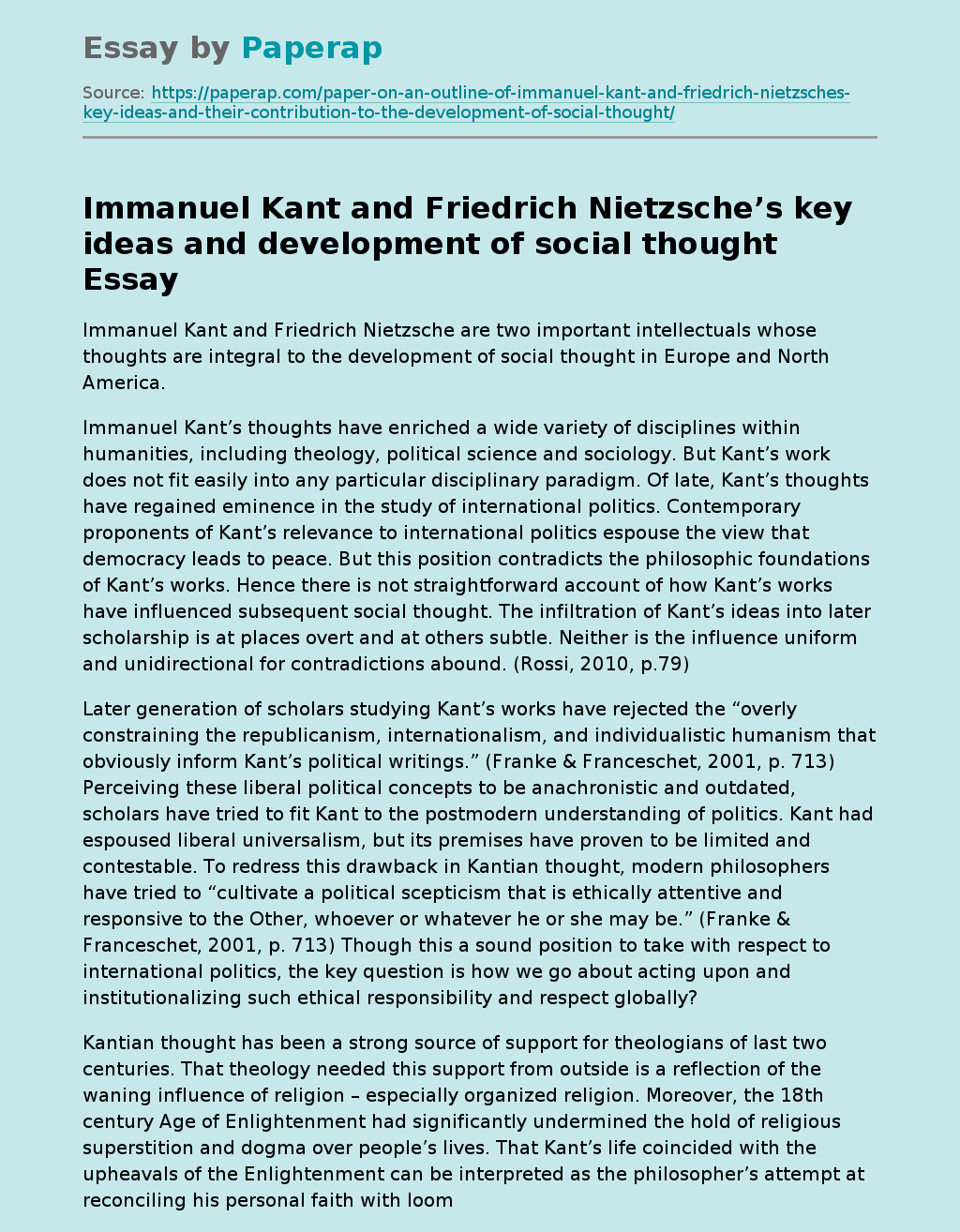Kant & Nietzsche's Social Ideas
Immanuel Kant and Friedrich Nietzsche are two important intellectuals whose thoughts are integral to the development of social thought in Europe and North America.
Immanuel Kant’s thoughts have enriched a wide variety of disciplines within humanities, including theology, political science and sociology. But Kant’s work does not fit easily into any particular disciplinary paradigm. Of late, Kant’s thoughts have regained eminence in the study of international politics. Contemporary proponents of Kant’s relevance to international politics espouse the view that democracy leads to peace.
But this position contradicts the philosophic foundations of Kant’s works. Hence there is not straightforward account of how Kant’s works have influenced subsequent social thought. The infiltration of Kant’s ideas into later scholarship is at places overt and at others subtle. Neither is the influence uniform and unidirectional for contradictions abound. (Rossi, 2010, p.79)
Later generation of scholars studying Kant’s works have rejected the “overly constraining the republicanism, internationalism, and individualistic humanism that obviously inform Kant’s political writings.
” (Franke & Franceschet, 2001, p. 713) Perceiving these liberal political concepts to be anachronistic and outdated, scholars have tried to fit Kant to the postmodern understanding of politics. Kant had espoused liberal universalism, but its premises have proven to be limited and contestable. To redress this drawback in Kantian thought, modern philosophers have tried to “cultivate a political scepticism that is ethically attentive and responsive to the Other, whoever or whatever he or she may be.” (Franke & Franceschet, 2001, p. 713) Though this a sound position to take with respect to international politics, the key question is how we go about acting upon and institutionalizing such ethical responsibility and respect globally?
Kantian thought has been a strong source of support for theologians of last two centuries.
That theology needed this support from outside is a reflection of the waning influence of religion – especially organized religion. Moreover, the 18th century Age of Enlightenment had significantly undermined the hold of religious superstition and dogma over people’s lives. That Kant’s life coincided with the upheavals of the Enlightenment can be interpreted as the philosopher’s attempt at reconciling his personal faith with looming currents of doubt created by rationalism. (Caird, 1889, p.56) Hence there is a degree of merit to the view that theological presuppositions are present within Kant’s work. A key term here is “theological horizons”, which served as a set of analytic frameworks for Kant’s argument of his theses. Such theological horizons function,
“in the first instance, on Kant’s own part, inasmuch as the critical philosophy articulates its account of human finitude over against a robust sense of transcendence. For Kant, fundamental to the conceptual space of the human–i.e., to the articulation of an account of what distinctively constitutes our humanity–is the orientation of that space to transcendence as it delimits the contours of our properly human finitude. In affirming human finitude–for which his trope is “the limits of reason”–as marked out by radical difference from transcendence, Kant stands within the theological horizon to which the reflective traditions of Abrahamic monotheism have oriented themselves in affirming “God” as the proper name for the transcendence humanity encounters in radical Otherness.” (Rossi, 2010, p.80)
Kant’s major thrust was not so much against pure reason as against our perception of the ‘real’. Kant found the founding principles of the Enlightenment problematic for they put reason and scientific inquiry as the sole medium for understanding reality. Kant argued against this eminence for human intellect by suggesting that reality as perceived by humans might be very different to absolute reality. That disillusioned reality that lies beneath what is merely apparent to us is unknowable. Hence there is the material reality founded by homocentric perception and the true reality. Kant makes a technical distinction between the two by calling the former the ‘phenomenal world’ and the latter the ‘nuomenal world’. Thus “our human minds have a built-in disposition toward illusion: the illusion that reality must be exactly the way we experience it. When we presume that our experience corresponds to reality, we are making an unjustified leap. We have absolutely no way to know this.” (Dahlen, 2011)
While Immanuel Kant’s influence was most pronounced during the 19th century, his successors, including Friedrich Nietzsche were taking centre stage at the beginning of the twentieth century. Nietzsche is an important intellectual, for he can be credited with ushering the era of postmodernism. Even prior to this retrospective understanding of Nietzsche, he was a pioneer of the Existentialist philosophical movement. Jean-Paul Sartre and Albert Camus’ contribution to existentialist thought is a follow up in the direction shown by Nietzsche. Just as Nietzsche’s importance is established, his legacy is undermined by persistent rumours about his alleged anti-semitism, pro-Nazism, misogyny, anti-morality and even insanity (during his last years).
In order to comprehend Nietzsche’s body of work, one has to look at his sources of inspiration and influence. Some of the earlier philosophers who influenced Nietzsche’s work include Socrates, Wagner, Kant, Schopenhauer; and to a lesser extent Luther and Darwin. But the influence is not always as a result of agreement with the earlier masters. For example in the case of Kant, Nietzsche’s relationship was polemical. Nietzsche’s body of work is closely associated with ‘virtue-ethics’. (Adam, 2001, p.324) The deeper one delves into various aspects of Nietzsche’s political philosophy, the clearer it becomes that Nietzsche’s political philosophy “merits reconstruction not only in broad historical terms. If we succeed in understanding the political perspectivism of Nietzsche’s ideas, we might also be able to contribute substantially to the received canon of political philosophy.” (Kiss, 2001, p. 373)
Kant & Nietzsche's Social Ideas. (2019, Feb 28). Retrieved from https://paperap.com/paper-on-an-outline-of-immanuel-kant-and-friedrich-nietzsches-key-ideas-and-their-contribution-to-the-development-of-social-thought/

